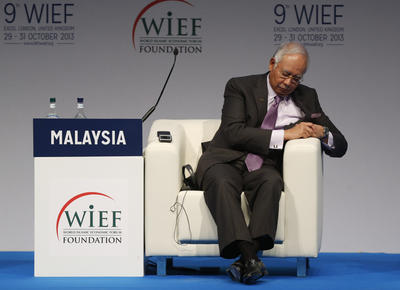Malaysia’s history of budget deficits gives reason to worry. The budget has been in deficit most years since 1971. Only in the period from 1993 to 1997 did the country enjoy budget surpluses. And while statements have occasionally been issued on the necessity for fiscal realignment, little has been done to turn speech into action.
Keynesian economists suggest that deficits be used when the economy is in a downturn and that when the economy is doing well there should be budget surpluses. Malaysia has chosen to ignore theory, permitting government spending in excess of revenue even when the economy has been doing well.
Because of this history of budget deficits, government debt in Malaysia has been creeping up. The most strident note in recent years came from Idris Jala, the Minister in the Prime Minister’s Department, in 2010. He warned that Malaysia would be bankrupt by 2019 unless subsidies were cut and borrowings restricted. He went on to add that Malaysia’s net government debt would rise from 54 per cent of GDP in 2010 to 100 per cent of GDP by 2019 if subsidies were not cut. In 2012, this figure stood at 53.3 per cent. It appears that Idris Jala’s warning is now being heeded, with the government attempting to reduce the debt-to-GDP ratio.
When Fitch downgraded Malaysia’s sovereign rating outlook from stable to negative in July 2013, it was a sharp reminder to policymakers of the reality that international observers are watching Malaysia’s economic performance. It’s not all bad news though: Fitch still maintains a good rating on Malaysia’s long-term foreign debt (A-) and long-term local debt (A).
But the downgrade still serves as a useful reminder to policymakers that fiscal consolidation needs to be tackled now, especially since general elections are over. On all counts this is a good time to take steps towards fiscal reform.
The introduction of the goods and services tax (GST), which was announced in the Budget 2014 speech and will take effect from 1 April this year, marks the start of the season for fiscal reform. The proposed GST rate of 6 per cent may be high, considering that this figure will in all likelihood inch up from year to year. That said, there is no doubt that the GST is an efficient tax: it broadens the tax base and can be imposed at every stage of the production process.
But the GST is also a regressive tax. A study conducted by Lim Kim-Hwa — published a few weeks before the GST was officially announced, and which assumes a rate of 7 per cent — suggests that low-income households, with an average monthly income of RM 605, will pay 2.62 per cent GST as a percentage of income. Those with an average income of RM 2579 per month will be pay 3.07 per cent of their income in GST, while the highest-earning households (with an average monthly income of RM 30,815) will pay only 1.56 per cent of their income in GST. The message is clear: the middle-class will be badly hurt. And although official inflation will increase, it won’t reflect the true impact of the reforms on prices, since the consumer price index includes items that won’t be subject to GST.
The other major fiscal reform being implemented is the program of subsidy rationalisation. The 2014 Budget announced the abolition of the 34 sen subsidy for sugar. This has recently been followed by a rise in the electricity prices, which will be increased by about 15 per cent on the Malaysian peninsular and about 17 per cent for Sabah and Labuan. The new rates took effect on 1 January 2014.
The increase in electricity rates will affect industrial and commercial users considerably since they account for 78 per cent of electricity consumption. But households will also be hit, and, once again, it can be expected that the middle class will be the worst affected.
Both of these reforms will help Malaysia regain the confidence of international agencies and investors. But introducing fiscal reform with only the interests of rating agencies and foreign creditors in mind is not the way to go either. All sectors have to tighten their belts, and that includes the public sector. The Auditor-General, in his annual report, had strongly commented on financial wastage through improper procedures and carelessness.
Former prime minister Dr Mahathir Mohamad has argued that the government should be more judicious in its expenditure. One hopes, however, that the reform programme does not go so far as to remove subsidies on healthcare at government clinics and hospitals, or for education in government schools and public universities. Fiscal reform in Malaysia has been neglected by policymakers for too long. The recently announced reforms are positive moves, but in reining in the deficit the government needs to ensure that any changes are equitable.
Shankaran Nambiar is a senior research fellow at the Malaysian Institute of Economic Research.
An earlier version of this article appeared in the Edge Financial Daily.


The govt is taxing and hurting the rakyat, but refuses to cut down wastage, corruption and exceptional high expenditure. While the subsidies to the rakyat are cut, nothing is done to cut the subsidies and compensations to corporations such as IPP’s and highways.